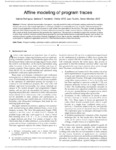Affine Modeling of Program Traces

Use this link to cite
http://hdl.handle.net/2183/21733Collections
- Investigación (FIC) [1678]
Metadata
Show full item recordTitle
Affine Modeling of Program TracesDate
2019-02-01Citation
G. Rodríguez, M. T. Kandemir and J. Touriño, "Affine Modeling of Program Traces," in IEEE Transactions on Computers, vol. 68, no. 2, pp. 294-300, 1 Feb. 2019. doi: 10.1109/TC.2018.2853747 , URL: http://ieeexplore.ieee.org/stamp/stamp.jsp?tp=&arnumber=8408540&isnumber=8611233
Abstract
[Abstract] A formal, high-level representation of programs is typically needed for static and dynamic analyses performed by compilers. However, the source code of target applications is not always available in an analyzable form, e.g., to protect intellectual property. To reason on such applications it becomes necessary to build models from observations of its execution. This paper presents an algebraic approach which, taking as input the trace of memory addresses accessed by a single memory reference, synthesizes an affine loop with a single perfectly nested statement that generates the original trace. This approach is extended to support the synthesis of unions of affine loops, useful for minimally modeling traces generated by automatic transformations of polyhedral programs, such as tiling. The resulting system is capable of processing hundreds of gigabytes of trace data in minutes, minimally reconstructing 100 percent of the static control parts in PolyBench/C applications and 99.9 percent in the Pluto-tiled versions of these benchmarks.
Keywords
Indexes
Upper bound
Optimization
Space exploration
Engines
Computational modeling
Intellectual property
Upper bound
Optimization
Space exploration
Engines
Computational modeling
Intellectual property
Description
This is a post-peer-review, pre-copyedit version of an article published in IEEE Transactions on Computers. The final authenticated version is available online at: http://dx.doi.org/10.1109/TC.2018.2853747
Editor version
ISSN
0018-9340
1557-9956
1557-9956





